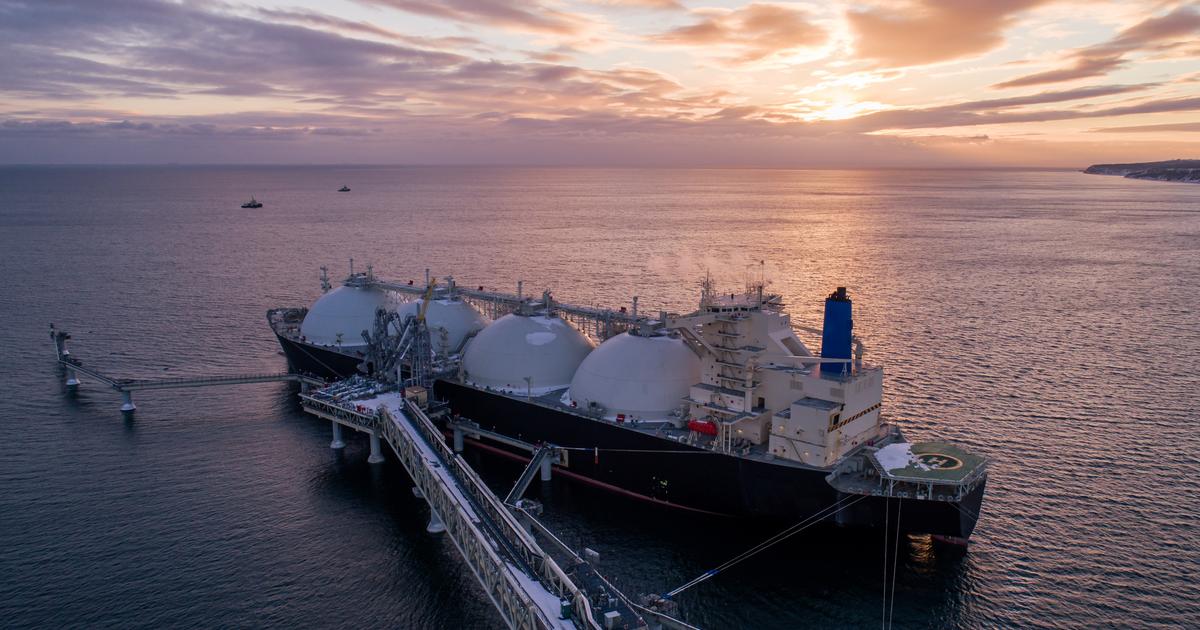Alternatives to Russian gas - expert on LNG in Germany: "We still have to catch up"
Created: 02/26/2022, 12:06 p.m
By: Matthew Schneider
Workers at a pumping station of the Druzhba pipeline in Belarus.
© AP/dpa/Sergei Grits
Can Europe free itself from dependence on Russian natural gas?
Thomas Peiß, analyst at BayernLB, explains the current options in an interview.
Mr Peiß, due to the war in Ukraine, the prices for futures transactions in summer and winter have almost doubled. Do you expect a complete failure of deliveries?
No, because that would mean that Putin would cut himself in the flesh.
The western side will only hit him with an import ban to a limited extent because he is sitting on large cash reserves and China is a grateful buyer for his natural gas.
But in order to build further pipelines to the east, a lot of time would pass in which he cannot earn any foreign exchange.
However, he could try to increase his liquid gas capacities towards China in order to partially or fully compensate for the loss of earnings from European gas supplies.
Many politicians want to make up for possible deficits with liquid gas (LNG). What quantities are currently available on the world market?
In 2020 there were about 500 billion cubic meters of LNG on the world market, mostly from the USA, Qatar, Australia and Russia.
Only about 37 percent of the LNG was available on the spot market, i.e. freely available for sale.
The rest is tied to long-term supply contracts, primarily in Asia.
Incidentally, in the example of Qatar, long-term means 20 years.
According to this, customers like Europe have arithmetically 185 billion cubic meters at their disposal.
In addition, the USA wants to increase production in the short term, by a third by the middle of the decade.
In addition, Australia has offered to negotiate with its customer Japan in the event of a total Russian failure.
The Japanese storage facilities are well filled and could cope with temporary delivery failures.
So far, Russia has supplied around 40 percent of Europe's gas needs,
in numbers, that's around 190 billion cubic meters that need to be replaced.
But: The prices on the spot market are demand-driven, so they can rise as high as you like.
Is the infrastructure sufficient to land correspondingly large quantities of LNG here?
There are currently 36 port terminals in Europe where liquid gas can be delivered by tanker and regasified.
None of them are in Germany.
So far, around 165 billion cubic meters of natural gas can be processed per year, i.e. fed into the distribution grid.
We still have to catch up on that.
It can also make strategic sense to build your own LNG terminal.
If Russia were to shut off the gas, we would now be totally dependent on getting the LNG landed in, say, southern Europe or the UK.
Can we expect relief from LNG in terms of medium-term gas prices?
No, because the large contingents are tied up in long contracts, we have to buy on the spot market.
There only the price determines who is supplied.
We are in strong competition with Asia, where coal is about to be replaced by gas.
In 2020, Japan and China purchased about as much LNG as all of Europe.
That's why we always have to pay more on the spot market than is offered in Asia.
In 2020, for example, the LNG price in Japan was almost double the German gas import price.
With the current significant crisis-related price premiums for gas, the price difference between LNG and pipeline gas is likely to narrow.
Are there other countries that could supply pipeline gas?
There are some opportunities in Europe itself. Norway had announced that it would already deliver at full capacity, but now wants to invest 18 billion euros in new projects.
There is a gas field in the North Sea that Germany and the Netherlands could develop together, but the federal government has not wanted to do this for environmental reasons.
Italy could also produce five times as much gas as before.
There are fields in front of Sicily.
Production off the Israeli coast is also exciting: From there, ten billion cubic meters are to be delivered by pipeline from 2026.
With so many suppliers, will there be any competitive advantages for Germany?
If you look at the current market, you mainly see long-term contracts.
If Europe wants secure energy, it must embrace it.
You can see what happens if you commit to a short-term commitment by looking at the current situation.
The prospects for the coming heating season are not very rosy. What can Germany do in the short term?
Become as independent as possible from imports.
This also includes saving as much gas as possible now and using good opportunities to fill up the storage tanks.
Renewable energies can make a contribution.
In February, for example, we had such power peaks in wind power that the price of electricity was close to zero.
If synthetic methane were to be produced with the excess energy, we could add this to the natural gas for heating.
Solar thermal, i.e. heat from the sun, also offers great potential for savings.
But the problem is the power supply.
According to the federal government's plans, gas-fired power plants with an output of 20 gigawatts are to be built to replace nuclear power and coal.
That will increase demand again.
The interview was conducted by Matthias Schneider.















